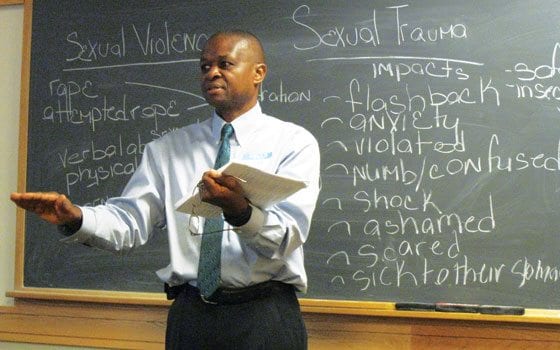
The Haitian Roundtable on Domestic and Sexual Violence, a coalition of agencies serving the local Haitian community, presented the 13th annual Domestic Violence Prevention Forum earlier this month at the Codman Square Health Center in Dorchester.
The five-hour event, titled “Strengthening Haitian Families in Time of Need,” drew more than 75 service providers and community members and addressed not only domestic violence, but also other issues affecting Haitians and Haitian Americans.
This year, the forum needed to address the emotional and practical needs of the community in the wake of the Jan. 12 earthquake, said Carline Desiré, executive director of the Association of Haitian Women in Boston (AFAB), one of the agencies organizing the event. To that end, workshop topics included trauma and self-care and the current state of Haitian immigration.
Dr. Linda Marc, a Haitian American epidemiologist and researcher with the Center for Multicultural Mental Health Research at the Cambridge Health Alliance, delivered the keynote speech. She described her research on sexual violence in Haiti.
Marc has analyzed years of rape case data from the Haitian State University Hospital in Port-au-Prince. Her not-yet-published findings show that from 2005 to 2009, the number of reported rapes shot up 185 percent.
Based on that hospital’s numbers and less formal data from other hospitals, she estimates a rate of 2000 rapes per year in the greater Port-au-Prince area — and the real numbers are likely much higher.
“This is an epidemic,” she told the audience.
Over the past decade, non-governmental organizations and Haitian government ministries have established rape and domestic violence hotlines, Marc said, making it easier for victims to report assaults and receive counseling.
But now, with 1.5 million or more Haitians still living in makeshift tent compounds seven months after the quake, the situation is almost certainly worse. With little privacy or security for dressing, showering, and going about daily survival activities, many women and girls are at even greater risk of assault.
“We don’t have post-earthquake data [on sexual assault],” Marc said, “but we can guess what might be happening.”
With this risk in mind, she is concerned about what kind of care systems are in place to help the women and girls that may end up coming from Haiti to the United States.
She listed a set of urgent health care priorities for recent immigrants, including screenings for HIV infection, cervical cancer and trauma- and violence-related mental health issues.
Marc’s primary area of study is HIV/AIDS, and a study she led has just been published in the journal “AIDS.”
The study examined 22 years of HIV data for Haitian-born immigrants in the U.S., and dispels the notion that Haitians have a higher rate of HIV infection than all other groups. The data also show a sharp decrease in HIV cases since 1997, she said, which suggests that interventions in the Haitian community can and do pay off.
“It’s my opinion that if the Haitian community can continue to get resources, we can continue to get HIV rates to go down,” she concluded. “Now we have to also focus on victims of sexual violence.”
At one point Marc touched on what was evidently a sore point with many in the audience — the media’s lack of attention to Haitian experts in the earthquake’s aftermath.
“They go to Haiti and interview humanitarian workers who’ve been there six weeks,” she said.
Her assertions drew a round of applause and a chorus of affirmative murmurs.
“The perception is there are no skills in the Haitian community,” she continued. “The perception is we need technical assistance. And that’s false. What we don’t have is the infrastructure and the funding. We have researchers; we have experts. The Diaspora has not been tapped as a resource to address our own problems. And if we do not act, solutions may be implemented that are not appropriate. The news media needs to come into our community to recognize the talents, the resources, and most of all the dedication to solving our issues.”
The Haitian Roundtable on Domestic Violence and Sexual Assault was formed by AFAB and Haitian American Public Health Initiatives to educate the community as a collective of service providers, and to share ideas and resources to stop domestic violence.
Other members include the Codman Square Health Center, the Boston Area Rape Crisis Center, the Massachusetts Department of Children and Families, the Haitian Multi Service Center, Massachusetts Community Health Services, the Family Justice Center and the Boston Police Department.
Besides the annual forum, the group holds monthly roundtable discussions on domestic violence prevention.






